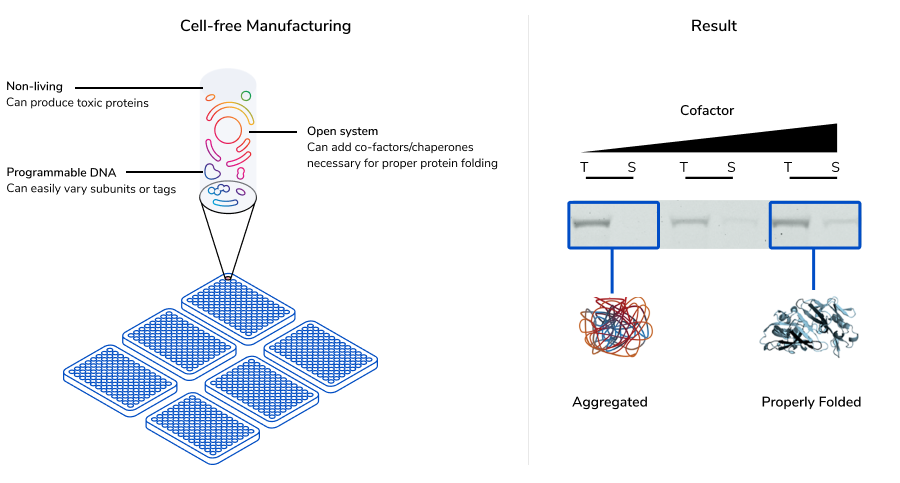Recombinant proteins are often used in research, diagnostics, and therapeutics, but some proteins can be difficult to express in traditional cellular systems. Factors such as toxicity, complexity, and post-translational modifications can limit protein yields and reduce functionality. In a cell-free system, many of the limitations of cellular expression can be bypassed due to the open nature of cell-free systems, enabling greater control over reaction conditions. With the ability to produce difficult-to-express proteins in high yields and with high purity, cell-free expression systems are a valuable tool for protein production and research.
Cell-free expression systems are useful when producing proteins that require multiple protein subunits because they provide a simplified environment for the assembly of these subunits into functional protein complexes. Many proteins require multiple subunits to function properly, including enzymes, transcription factors, and receptors. The subunits of these proteins must come together in a specific way to form the active complex.
Traditional methods for producing multi-subunit proteins involve the expression of each subunit in living cells and subsequent purification and assembly of the individual subunits. This can be a time-consuming and challenging process, particularly for proteins with complex subunit arrangements.
In contrast, cell-free expression systems provide a simplified environment for the production and assembly of multi-subunit proteins. These systems use cell extracts or purified components to synthesize proteins in vitro. By controlling the concentrations and ratios of the individual subunits in the expression system, researchers can promote the assembly of multi-subunit proteins into their active forms.
In addition to simplifying the production process, cell-free expression systems offer other advantages for the production of multi-subunit proteins. They can be used to produce proteins that are toxic or difficult to express in living cells. They also allow for rapid optimization of expression conditions, as changes to the expression system can be made quickly and easily.
Overall, cell-free expression systems are a valuable tool for the production of multi-subunit proteins, as they offer a simplified environment for the assembly of protein complexes and allow for greater control over the production process.
Case Study: Integrases/DNA-binding proteins
For some DNA-binding proteins, their stability is dependent being able to interact with their associated DNA sequences. In cell-free systems, DNA templates can be added to the cell-free system in varying amounts and forms, allowing for the optimization of protein expression and folding conditions.

Tierra's system is open to allow for easy co-factor addition, and empirical condition testing only limited by scalable liquid handling. A pharmaceutical partner needed an integrase that was difficult to make in cells. Tierra was able to produce properly folded protein by empirically testing multiple conditions and identifying a critical co-factor which aided protein stability and solubility.
Contact us to make difficult-to-express proteins easy using the power of cell-free biology.